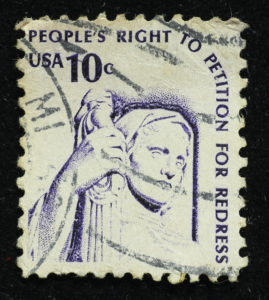Does Noerr–Pennington Immunity Apply to State-Law Tort Claims?
A claim under N.C. Gen. Stat. § 75-1.1 can sometimes trigger a constitutional challenge. A defendant might argue that an unfairness claim under section 75-1.1 is unconstitutionally vague, or that applying section 75-1.1 extraterritorially violates the Dormant Commerce Clause.
Or a defendant might argue that the claim concerns conduct protected by the First Amendment under the Noerr–Pennington doctrine.
This post concerns a new decision from the Supreme Court of North Carolina on that issue called Cheryl Lloyd Humphrey Land Investment Co. v. Resco Products, Inc. The case doesn’t involve a section 75-1.1 claim, but it involves a popular predicate violation: tortious interference.
What is the Noerr–Pennington doctrine?
The Noerr–Pennington doctrine grants immunity for legitimate petitioning conduct directed at any branch of government. Protected conduct can include litigation activities and even pre-litigation communications.
Noerr–Pennington derives from the First Amendment’s Petition Clause, which provides for the “right of the people . . . to petition the Government for a redress of grievances.” The doctrine evolved from antitrust cases, but courts have extended its application to other claims, including tortious interference.
The Cheryl Lloyd case
This background brings us to the Cheryl Lloyd decision. The defendants in the case, Resco Products, Inc. and Piedmont Minerals Company, operate a mine in Hillsborough, where they conduct blasting operations.
The plaintiff, Cheryl Lloyd Humphrey Land Investment Company, wanted to build townhomes on an undeveloped lot next to the mine. Cheryl Lloyd contracted with a developer, Braddock Park Homes, to construct the townhomes in two phases. In the first phase, Braddock would purchase about 41 acres. The second phase gave Braddock a “free look” at another part of the lot—5.5 acres next to Resco and Piedmont’s blasting operations—but gave Braddock the right to opt out of building on that land.
The development was conditioned on the Town of Hillsborough annexing the property and rezoning the land for residential use.
Resco and Piedmont opposed the development. At a public hearing, they told the Town that the 5.5 acres in the second development phase was too close to their blasting operations and would pose serious danger to future townhome residents.
Those grievances fell on deaf ears with the Town, which annexed and rezoned the property. But those concerns resonated with Braddock, which decided not to purchase the land next to the blasting zone.
Cheryl Lloyd sued Resco and Piedmont. It accused them of scaring Braddock away from purchasing the 5.5 acres, and it characterized their comments from the zoning hearing as malicious and without justification.
Resco and Piedmont moved to dismiss. Their argument? The Noerr–Pennington doctrine immunized their conduct—comments at the public hearing—from civil liability.
The trial court granted the motion, which prompted the appeal.
But the Court of Appeals reversed. It held that Noerr–Pennington is limited to antitrust and unfair-competition claims—claims that involve a “dispute between competitors” or “the consolidation of market power.” Thus, the Court of Appeals concluded that Noerr–Pennington immunity was categorically unavailable for a tortious-interference claim. The Court reached this holding even though the parties agreed that Noerr–Pennington applied to the facts of the case.
The N.C. Supreme Court reverses.
Resco and Piedmont filed a notice of appeal based on a constitutional question and a petition for discretionary review. The Supreme Court granted the petition and, in a unanimous decision, reversed the Court of Appeals.
The Supreme Court held that Resco and Piedmont’s comments at the public hearing qualified as petitioning activity protected under both the federal and state constitutions. Unlike the Court of Appeals, the Supreme Court did not focus on the label of Cheryl Lloyd’s claim. Instead, it focused on the nature of the speech targeted by that claim. The Court explained that “[p]rotecting the right to petition requires early dismissal of lawsuits that impermissibly seek to infringe on the right and thus chill petitioning activity occurring in . . . political contexts.” After all, “[e]xpressing one’s views to government officials is foundational to our political system.”
While the Supreme Court acknowledged the Petition Clause underpinnings of the Noerr–Pennington doctrine, it avoided defining the scope of Noerr–Pennington immunity. Instead, the Court based its holding on a broader immunity that arises from the Petition Clause itself.
The decision makes clear that the absence of a claim that alleges an anticompetitive effect does not doom the exercise of immunity for petitioning conduct in North Carolina state court. This is consistent with how courts in other jurisdictions—including the Fourth Circuit—have extended Noerr–Pennington and Petition Clause immunity to claims outside of the antitrust and competition context.
Author: Scottie Forbes Lee



